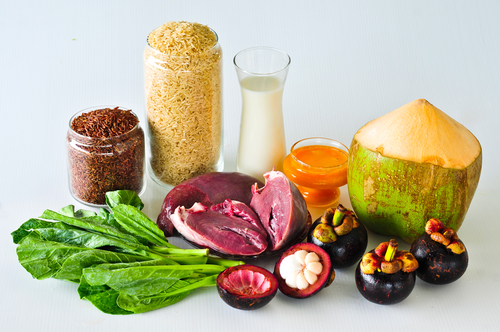
Photo: Shutterstock
Riboflavin, also called Vitamin B2, is a water-soluble B vitamin. This vitamin is essential for the production of red blood cells and growth and functioning of the lining of the digestive tract, skin and other parts of the body. It also helps the body release energy from carbohydrates.
Riboflavin must be stocked up on every day as it cannot be stored in the body and excess amounts are excreted through urine. Food rich in this vitamin include dairy, eggs, legumes, nuts, meats and green vegetables.
Some foods, such as bread and cereals, may have riboflavin added into it to prevent deficiencies among the public. Foods containing this vitamin should not be exposed to light as this can cause the destruction of the vitamin.
“Riboflavin is also used for the development and function of the skin, lining of the digestive tract, blood cells and other vital organs,” says Sherry Ross, women’s health expert at Providence Saint John’s Health Center in Santa Monica, California.
Here are some major health benefits of Riboflavin:
Prevents headaches including migraine
Vitamin B2 is an established method for curing painful migraine headaches. A dose of 400 mg is generally used for those who are regularly prone to migraine attacks.
Ensures healthy eyes
Riboflavin is a vital factor for ensuring healthy corneas and perfect vision. According to the University of Michigan, this vitamin is needed to protect glutathione, which is an important antioxidant in the eye. Taking supplements containing riboflavin and niacin may also be helpful in preventing cataracts.
Helps wound healing
Riboflavin is an essential factor in maintaining tissues and cells. It is required for normal cell growth and repair. It also quickens the process of injury healing.
Enhances natural immunity
Vitamin B2 is required for the process of synthesis of antibodies. It helps to boost natural immunity by strengthening the antibody reserves and by reinforcing the defense system against infections.
Provides antioxidant properties and defends against cancer
Vitamin B2 acts as an antioxidant that controls the play of free radicals. It helps in the prevention of heart diseases and cancer.
Maintains healthy hair and skin
Riboflavin helps in maintaining collagen levels, which is essential for healthy skin and hair. It helps in secretion of mucus that keeps the skin moistened. Therefore, it prevents conditions like eczema and dermatitis.
Symptoms of Riboflavin deficiency
Although deficiency of riboflavin is uncommon, some symptoms of a severe deficiency include anemia, skin disorders, sore throat, mouth sores and the swelling of mucus membranes. You can easily consume your needed daily requirement of riboflavin and other vitamins by eating a balanced diet and a variety of foods, including fruit and vegetables.
The amount of riboflavin you would need to consume daily depends on factors such as your age, gender and health. For instance, if you are pregnant you will need more riboflavin. If you are ill, the amount you need is also affected. Check with your doctor about what your vitamin needs are and how best to fulfill them.
Here’s a general guideline according to MedicinePlus:
- 0 – 6 months: 0.3* milligrams per day (mg/day)
- 7 – 12 months: 0.4* mg/day
- 1 – 3 years: 0.5 mg/day
- 4 – 8 years: 0.6 mg/day
- 9 – 13 years: 0.9 mg/day
- Males age 14 and older: 1.3 mg/day
- Females age 14 to 18 years: 1.0 mg/day
- Females age 19 and older: 1.1 mg/day
*Adequate Intake (AI)
Please like FamiLife’s page on Facebook so that you get all our articles and others may find us.
